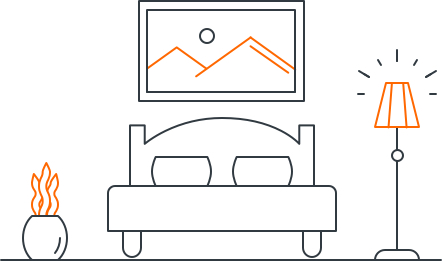5 Housekeeping Scenarios You Can Avoid at Your Hotel

Across just about any field or industry, companies acknowledge — and, if they’re wise, specifically focus on — the importance of communication in the workplace. Without some system or training in place to emphasize and optimize the connectivity of your team, you’re destined to face persistent struggles. Your productivity, as well as the overall morale of your staff, will suffer long-term, and your endurance as a manager will likely be tested.
In the hospitality industry (yes, perhaps moreso than others), communication is absolutely vital to staying ahead of your competition and establishing an ongoing relationship with customers. After all, you certainly face no shortage of worthwhile hotels that might provide superior service, and therefore earn more market share, than yours.
Of course, it doesn’t need to be that way. We’re not advocating for a complete overhaul of your operation, however. All we’re suggesting is that you develop a greater understanding of how the communication among your staff might be improved and what circumstances you may be forced to deal with if you aren’t proactive about it.
Running a hotel requires constant vigilance and attention to even the smallest details. You need to be willing to evaluate your systems — especially those as integral as communication — and explore alternative approaches that might yield a better return on your investment. Need a little convincing?
We thought as much. So here are a few examples of instances which could have easily been avoided if you had a reliable communication tool assisting you and your housekeeping staff in the course of your duty.
Scenario #1
 One of the most common requests that hotel staffs tend to accommodate is the early check-in. Travelers often make their way to their destination ahead of schedule, due to a combination of smooth traffic conditions and/or flights that wind up miraculously arriving on time. And, if you do have a room available a few hours early, it only benefits you to offer your guests the opportunity to settle down and recover from their journey as soon as possible.
One of the most common requests that hotel staffs tend to accommodate is the early check-in. Travelers often make their way to their destination ahead of schedule, due to a combination of smooth traffic conditions and/or flights that wind up miraculously arriving on time. And, if you do have a room available a few hours early, it only benefits you to offer your guests the opportunity to settle down and recover from their journey as soon as possible.
In most cases, the only real change this may lend to your schedule is that you’ll need to ensure that the incoming guests’ room has been properly cleaned and supplied so that everything is in order for their arrival. Therein lies the potential for communications to go awry.
Let’s say that guests have just arrived nearby and are roughly an hour or so away. They reach out to the front desk to request early check-in, but despite the existence of a vacant room and an available housekeeping staff, the staff member who was tasked with bringing the room’s cleanliness up to standards never receives the message to prepare the room for the incoming guests.
They simply continue with their workload as normal, leaving the guest and the hotel with a major service problem. Perhaps your communication tool has suffered a malfunction. Whatever the case may be, the staff member does not get to clean the room on time, and the guests are forced to wait in the lobby or return later. This reflects poorly on your establishment and creates a bad first impression of your hotel and the service you and your staff provide.
Scenario #2
Because your hotel has so many guests coming in and out at various times, you never know when an accident is going to take place. Travelers often attempt to carry their own bags, and it’s possible (or even likely) that spills and other hazardous situations can occur in the lobby, the halls or the common areas of your hotel.
When this happens, it’s naturally your staff’s responsibility to tend to such messes. After all, you can’t expect your guests to clean up the mess. It’s a courtesy service provided by the staff of the hotel and one that needs to be addressed as quickly as possible to prevent an on-site injury. You see where we’re going with this.
So a spill does happen somewhere in your hotel. Let’s say in one of the common areas, where you have tile or another slick surface on the floor. The guest responsible reports the spill, and a general message is sent out to the housekeeping staff to clean it up before someone gets hurt. Of course, because each staff member is tied up with other tasks, they may not hear the initial message, as they may be on break or involved in other work at that moment.
By the time the front desk does follow up, someone has already slipped and hurts themselves. This delayed communication — which happens at no fault of the housekeeping staff, which was so entrenched in their work that they missed a brief, yet vital, message — now leaves the hotel open to guest complaints as well as perhaps a liability issue.
 Scenario #3
Scenario #3
Part of what makes managing a hotel such a challenge is the revolving door (sometimes literally) of guests you have coming in and out of your hotel at all times. That’s a lot of variables to attend to at once, as any and all guests may need or request service at any time.
With so many rooms occupied, you and your staff have to ensure that your communication is running at optimal levels to keep everything done quickly and in line with the quality standards you aim to uphold. It doesn’t take much for something to go wrong or for a message to get lost in the shuffle, especially when it comes to identifying what needs to be done and where.
Say, for instance, that a guest is set to arrive shortly after regular check-in time (not early, as we discussed above). The front desk confirms the reservation and so dispatches a member of the housekeeping staff to prepare the room. Naturally, it’s a particularly busy day, and the staff doesn’t get there until soon before check-in time to change the sheets, clean up and the rest of the standard services.
But there’s a problem. Due to a garbled message or some other miscommunication, they’ve actually just prepared the wrong room. Now the guests arrive without a room ready for them. With a reliable communication system in place, it might have prevented this kind of mishap. As it stands, the housekeeping staff may wind up penalized for a problem that wasn’t their fault, and the person that suffers the most is the guest, whose entire schedule has just been thrown off.
Scenario #4
The relationship between the housekeeping staff and the front desk is key to maintain the guest experience. Guests count on the clear communication between the two for many reasons, including as a resource for basic supplies. If they need a toothbrush, additional pillows or more coffee, they’ll call the front desk up and ask to have the requested items brought up to their room. It’s just another benefit of the guest experience, that they can count on such service to make them feel at home throughout their stay. Most guests are understanding that housekeeping staff may be busy at the moment of their call and will happily wait a brief period for their request to be honored. However, to maintain a positive guest experience, your hotel always wants to aim to tend to their needs as soon as you can.
Without the right communication system, the housekeeping staff is bound to encounter many, many instances in which they are unable to adequately respond to guests. Anytime a guest reaches out to the front desk to express a simple need for supplies for their room, the housekeeping staff trusts its counterpart to convey the message effectively.
However, if the front desk is unable to be reached, this creates a disconnect that causes undue distress for the housekeeping staff. To avoid this, you need a system that will accept and retain messages. Otherwise, you may miss messages entirely.
Because of this, your guest’s request may never be met, lest they call repeatedly or even be forced to come down to the front desk to place it. In any case, this does undue damage to their faith in you and your service, making the housekeeping staff’s already-busy job that much more hectic.
Scenario #5
Everyone loves room service. Who wouldn’t love the idea of waiting in your hotel room and having food delivered directly to you? Much like some of our previous scenarios, this one depends on you having a communication system that reacts in real time to guest requests.

When a guest calls for room service (or anything else, really), your entire staff needs to be ready to respond accordingly. But there’s a lot more to room service orders than simply accepting the call and delivering the correct order. You also have to ensure that the housekeeping staff is kept up to date on each delivery so that they can swing by for clean-up purposes.
As much as guests love having freshly prepared food brought right to their door, no one wants to have to deal with the lingering odor and unpleasant sight of a pile of messy dishes once they are done. If miscommunication or delayed communication invades the process, your staff might make never know that they have a mess to retrieve from a guest that recently enjoyed a bit of room service.
No one likes seeing dirty dishes piled up outside of guest rooms while walking down the hall. Whether or not your establishment offers room service, the principle of this scenario remains the same. Your housekeeping staff has a true responsibility to accurately, efficiently and effectively respond to guest requests, no matter how trivial they may seem. Your priority needs to be on delivering consistently strong service, and how your housekeeping staff reacts to room service is the ultimate test of that.
Communication Fixation
If we seem particularly devoted to spreading awareness of how communication factors into businesses like your own, it’s because we know first-hand how much of a difference it can make. Our mission is to help companies adopt and implement a proven communication tool that ensures that you and your staff are on the same page, possibly for the first time ever.
Although hotels generally stick to walkie talkies, such two-way radio technology is fast becoming obsolete, not only because of the expense but the dwindling convenience they provide. We now have a much better alternative, one that sidesteps the concerns we directly addressed above. All it takes is the courage to step outside of complacency and gives a tool like ours the chance to prove itself.
An alternative like Voxer can also open the door to establishing different policies amongst the staff. Perhaps you want to utilize the camera feature to take and send photos of newly cleaned rooms. Not only does this give the manager in charge visual piece of mind, but it can also help denote if a guest should be charged for minibar items or snacks.
They say that communication is key to the success of any relationship. In our experience, this is certainly true. So why shouldn’t you apply that same wisdom to helping your housekeeping staff function as smoothly and effectively as possible? Not only does good communication help people in the workplace, but it translates into a better guest experience.
And, ultimately, this should always be your priority. Whether or not you’re willing to settle for frustrating, subpar relations among your hotel staff is entirely up to you. However, your guests will also reap the rewards if you do decide to embark on an exciting new foray into modern staff communication.
In no time flat, you’ll discover just how well you can get the job done, as will your guests. We’re guessing you’ll never look back at the way you used to do things.

